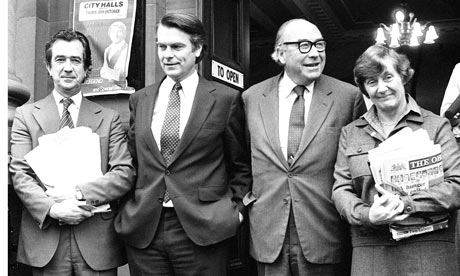UKIP Isn't the SDP !

Basic rule of British, or rather English politics – new Parties never get anywhere! For a time in the early 1980s it did seem that the mould of British politics was being changed. In response to Margaret Thatcher's then hugely unpopular Conservative Government and the Labour Party’s near fatal lurch to the neo-Marxist Left the Social Democratic Party (SDP) was formed and in 1981/1982 for a short time it was successful. The SDP was a breakaway from Labour of 28 MPs so from its start it had a significant representation in the House of Commons. Looking back with hindsight virtually all of the SDP’s core policies were adopted – mostly by the “New Labour” Party of Tony Blair and Gordon Brown. The SDP was the moderate Centre/Left Party that Labour had to become to be electable.
So if the SDP was the opposite of extremist and had ideologies that were broadly to underpin the Labour governments of 1997-2010 why why did it not succeed in the early 1980s? There were two main reasons. First it was “timing”. In 1982 with Thatcher on her knees the Falklands War came to her rescue. Some opposition to the Iron Lady melted away as sufficient of the British electorate by 1983 had decided that a woman who showed such courage and determination in the Falklands could apply those qualities in other areas as well. The other reason was the electoral system. Notwithstanding the Falklands in the May 1983 election the Conservatives only got 42.4% of the vote. The SDP in alliance with the Liberal Party had 25.4% – only just behind Labour on 27.6%. But the First Past the Post electoral system did not at all allow these figures to be represented in seats. Here the Tories got 397 to Labour’s 209. And the SDP/Liberals got just 23.

Roll forward to today and the rise of another new Party the United Kingdom Independence Party or UKIP. If the SDP was a breakaway from Labour then UKIP can be seen as a breakaway from the Conservatives. Except that actually nobody of any significance has in fact broken away from the Conservative Party to join UKIP! Their leader Nigel Farage (pictured) was once a Conservative and others in the Party leadership had once been Tories as well. But as they have risen in the opinion polls and secured a huge amount of media coverage not one significant current day Conservative ( and certainly no MP) has joined them. This is in part because the Conservatives already have a Party within a Party which is not that different from UKIP in its ideology. The Tory Right, comprising perhaps 100 MPs (and a fair number of Cabinet ministers), is fiercely anti Europe and want sweeping changes to Britain's immigration laws – signature UKIP policies. They believe that to stay inside the Tory tent is preferable to throwing in their lot with Mr Farage.
The problem with UKIP, and where it differs completely from the SDP, is that it is a “gut feel” Party – it appeals to the very basic prejudices in us. Where the SDP was intellectually robust and almost painstaking in the rationale for its policy programme UKIP is populist and shallow. But it has its appeal - as Labour commentator Mark Ferguson put it:
“What UKIP are tapping into is something incredibly potent – the anger of the supposedly apathetic. Many of who have long felt excluded from (or ignored by) the political process find in UKIP’s forceful approach something they can get behind.”
The SDP was defeated by “events”, by the unfairness of the electoral system and, to an extent, by the rise in Margaret Thatcher's popularity post Falklands. The unchanged electoral system will work against UKIP as well – even if they secured 15-20% of the votes in a General Election they would probably fail to get any seats. But that does not mean they are insignificant – far from it. The “Kippers” as they are known can be a serious threat to the established Parties – but above all to the Tories. UKIP voters are not taken evenly from other Parties but come predominantly from those who would have voted Conservative (if they had voted at all). So whilst many of us might find UKIP’s policies repellent there is no doubt that the Conservative party (especially those “Kippers in Tory clothes” in Parliament) will want to adopt some UKIP policies in the run up to the 2015 election to try and get their voters back. There is also no doubt that a strong UKIP vote will mean a Labour government – one of the paradoxes that our undemocratic electoral system delivers us.
Margaret Thatcher hugely benefited from the divisions on the Left of politics in the 1980s and was re-elected twice despite never securing anything like a majority of the popular vote. Mr Miliband could benefit in a similar way from the divisions on the Right in the present day as marginal seats fall to Labour because of a split in the “conservative” vote. As Mrs Thatcher said “Its a funny old world”.

0 Comments:
Post a Comment
Subscribe to Post Comments [Atom]
<< Home